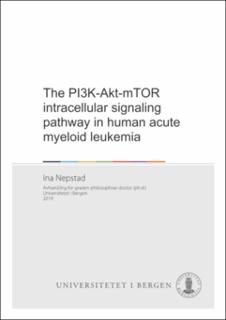| dc.contributor.author | Nepstad, Ina | en_US |
| dc.date.accessioned | 2019-12-02T13:14:39Z | |
| dc.date.available | 2019-12-02T13:14:39Z | |
| dc.date.issued | 2019-03-08 | |
| dc.identifier.isbn | 978-82-308-3529-6 | en_US |
| dc.identifier.uri | https://hdl.handle.net/1956/21042 | |
| dc.description.abstract | Acute myeloid leukemia (AML) is a heterogeneous malignancy where disruption of normal intracellular signaling occurs due to mutations or abnormal external signaling. Many pathways have emerged as potential targets for pharmacological intervention, including the PI3K-Akt-mTOR pathway. Aberrantly upregulated PI3K-AKT-mTOR signaling characterizes many types of cancers and may represent an adverse prognostic parameter; this is possibly also true for AML since several observations suggest that this pathway is important in leukemogenesis. Targeting of this pathway with specific inhibitors could therefore result in suppression of leukemic cell growth. Our hypothesis was that AML patients differ with regard to the impact of PI3K-Akt-mTOR signaling in leukemogenesis and chemosensitivity, and that patients thereby differ with regard to their susceptibility to various PI3K-Akt-mTOR inhibitors. The aim of this thesis was to further characterize the patient heterogeneity in human AML through studies of (i) the constitutive expression of selected mediators in the PI3K-Akt-mTOR pathway; (ii) how the signaling pathway is modulated by the agonist insulin and by various pathway inhibitors; and (iii) through molecular studies to try to elucidate possible mechanisms behind the heterogeneity of PI3K-Akt-mTOR signaling in AML. Our studies confirmed that constitutive activation of the PI3K-Akt-mTOR pathway differed between patients and two main subsets with high and low pathway activation were identified based on PI3K-Akt-mTOR activation profiles. Our overall results described in this thesis showed that AML patients are heterogeneous with regard to constitutive PI3K-Akt-mTOR activation, and the same was observed when studying the effect of agonistic insulin and the effects of various pathway inhibitors in the presence of insulin. Insulin increased the phosphorylation of mediators in the PI3K-Akt-mTOR pathway, and this effect was especially seen for mediators upstream of mTOR. Our studies showed that patients differed with regard to the energy, amino acid, and arachidonic acid metabolism in their leukemic cells, and the metabolic profile seemed to differ between primary AML cells that were susceptible or resistant to the antiproliferative effect of PI3K-Akt-mTOR pathway inhibitors. Susceptible and resistant cells to pathway inhibitors then seemed to differ especially in arachidonic acid, proline and/or energy metabolism. However, our studies also suggest that differences in redox homeostasis may be important. In the final work, we demonstrated that clonal heterogeneity could be reflected in the activation status of mediators in the PI3K-Akt-mTOR pathway. We found that this heterogeneity was associated with adverse prognosis, i.e. the survival after intensive antileukemic treatment was decreased for patients showing evidence for clonal heterogeneity when analyzing the pathway activation profile. Patients with and without evidence for clonal heterogeneity differed in their global gene expression profiles, especially with regard to expression of genes encoding proteins that are important for G protein coupled receptor signaling. To conclude, the possible importance of the differences found between AML patients should be considered when designing and/or analyzing the results in future clinical studies of PI3K-Akt-mTOR inhibitors, and possibly also when considering combination of pathway inhibitors with other targeting therapies or conventional chemotherapy. Biological heterogeneity reflected in the intracellular signaling status should also be further investigated as a potential prognostic biomarker in human AML both in patients receiving intensive and possibly curative treatment, and in elderly/unfit patients receiving AML-stabilizing treatment. | en_US |
| dc.language.iso | eng | eng |
| dc.publisher | The University of Bergen | eng |
| dc.relation.haspart | Article I: Nepstad I, Hatfield KJ, Aasebø E, Hernandez-Valladares M, Brenner AK, Bartaula-Brevik S, Berven F, Selheim F, Skavland J, Gjertsen BT, Reikvam H. Two acute myeloid leukemia patient subsets are identified based on the constitutive PI3K-Akt-mTOR signaling of their leukemic cells; a functional, proteomic, and transcriptomic comparison. Expert opinion on therapeutic targets. 2018 Jul 3;22(7):639-53. The article is not available in BORA due to publisher restrictions. The published version is available at: <a href="https://doi.org/10.1080/14728222.2018.1487401" target="blank">https://doi.org/10.1080/14728222.2018.1487401</a> | en_US |
| dc.relation.haspart | Article II: Nepstad I, Hatfield KJ, Aasebø E, Hernandez-Valladares M, Hagen KM, Rye, KP, Berven F, Selheim F, Reikvam H, Bruserud Ø. Effects of insulin and pathway inhibitors on PI3K-AKT-mTOR activation in acute myeloid leukemia cells: a study of patient heterogeneity and the phosphorylation profiles of pathway mediators. The article is not available in BORA. | en_US |
| dc.relation.haspart | Article III: Nepstad I, Reikvam H, Brenner A, Bruserud Ø, Hatfield K. Resistance to the antiproliferative in vitro effect of PI3K-Akt-mTOR inhibition in primary human acute myeloid leukemia cells is associated with altered cell metabolism. International journal of molecular sciences. 2018 Feb;19(2):382. The article is available at: <a href="http://hdl.handle.net/1956/19799" target="blank">http://hdl.handle.net/1956/19799</a> | en_US |
| dc.relation.haspart | Article IV: Nepstad I, Hatfield KJ, Tvedt TH, Reikvam H, Bruserud Ø. Clonal heterogeneity reflected by pi3k-akt-mtor signaling in human acute myeloid leukemia cells and its association with adverse prognosis. Cancers. 2018 Sep;10(9):332. The article is available at: <a href="http://hdl.handle.net/1956/19777" target="blank">http://hdl.handle.net/1956/19777</a> | en_US |
| dc.title | The PI3K-Akt-mTOR intracellular signaling pathway in human acute myeloid leukemia | en_US |
| dc.type | Doctoral thesis | |
| dc.rights.holder | Copyright the author. All rights reserved | |
| dc.identifier.cristin | 1689565 | |
